I’m not as prepared for this hurricane as I normally am for impending potential disaster. For some idiotic reason, I’m just fairly convinced it’s going to veer west and just give us some bad wind and rain without being catastrophic. Famous last words, I know.
Local governments have moved quickly to keep us informed and prepared. The information flow has been steady and clear, and the local daily has lowered its paywall until this hurricane is no longer news. It’s updated the hurricane story about once an hour.
After January’s false missile alarm, everyone, including our emergency response agencies and our governor, is making sure to present as transparently and clearly as possible. Not a bad response to something that turned Hawaii into a punchline seven months ago.
The state shut down all schools and non-essential government offices on Hawaii Island Wednesday. Then did the same for Maui and Oahu Thursday and Friday. I work on the campus of a public university, so when they shut down school, my employer followed suit so we could all prepare ourselves and our homes, and to keep as many of us as possible off the streets.
I’m writing this in the wee hours of Friday morning, and it’s blustery but clear with no rain. If the projections are accurate, the storm will get closest to me between 8 p.m. Friday and 8 a.m. Saturday as it veers west. Hurricanes are more predictable than they were thirty years ago, but they’re still not super predictable, so it could continue north instead without veering west, in which case this island is in for it.
My Kindle is charged up and loaded with new material (the second and third Kevin Kwan books), so I think I’m ready.
From here.
- What’s a stupid lyric from a song you like?
I like a lot of songs with stupid lyrics, but how about “Wild Thing?” “Wild thing I think you move me / but I wanna know for sure / come on and hold me tight / you move me.” - What’s a pretty good lyric from a song you dislike?
This is a pretty difficult question to answer. If I’m familiar enough with it to remember its lyrics, I probably don’t dislike it, and if I dislike it, its lyrics are probably one of the reasons. But okay, I just thought of one. James Blunt’s “You’re Beautiful,” a song I really hate, actually has a decent premise, and I like “She smiled at me on the subway / She was with another man / But I won’t lose no sleep on that / ‘Cause I got a plan.” - What’s a good non-Weird-Al-Yankovic lyric about food and drink?
Talk about songs with stupid lyrics: Ehukai’s “Molokai Slide” should have come first to mind. I looooove this song and once recorded myself singing and playing it for my grandmother as a birthday present, but boy are the lyrics terrible. Still, one reason I like it is the way it waxes (not really) poetic about some of the food we love here. “I like the fishes swimming around in the sea / I like to hop ’em on the grill and cook ’em up for me / with a big pan of butter / man it can’t get better than this.” Thinking of my beloved islands on this really strange weekend as we wait for nature (most days a blessing around here) to have her way with us. - What’s a good song lyric to describe your week?
AC/DC’s “I’m a rolling thunder, a pouring rain / I’m comin’ on like a hurricane / My lightning’s flashing across the sky / You’re only young but you’re gonna die!” (“Hell’s Bells”) - What’s a good song lyric about inclement weather?
“Stormy Weather,” recorded by a million artists, always makes me think of my favorite TV show of all time, M*A*S*H, because the song pops up in a couple of episodes. “Don’t know why there’s no sun up in the sky: stormy weather…”
Take me back, back to da kine
Take me back, back to da kine
All ova’ mo’ bettah, Molokai
I will return…

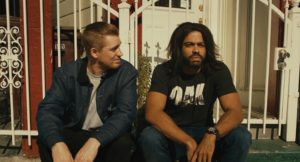 It would take longer to describe the plot of Blindspotting than I want to take, and anything I’d write might fail to convince you to see this movie, which is what I really want. The writers (who also star) try to do a lot with this story, most of it successfully, but the accomplishment isn’t in the story; it’s in the development of these characters toward a face-off over issues so layered that it takes all these plot elements to get us ready for it.
It would take longer to describe the plot of Blindspotting than I want to take, and anything I’d write might fail to convince you to see this movie, which is what I really want. The writers (who also star) try to do a lot with this story, most of it successfully, but the accomplishment isn’t in the story; it’s in the development of these characters toward a face-off over issues so layered that it takes all these plot elements to get us ready for it.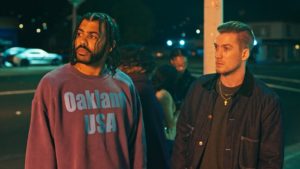 Daveed Diggs plays Collin, a late-20s black man living in a halfway house. He has three days left on his probation after a prison sentence. For three days, he must stay completely out of trouble, but there are pitfalls all over the place in his hometown of Oakland. It’s tempting to think forces are amping up their game against him in these three days, but one gets the feeling after getting to know this man that it’s not these three days: it’s every day that a black man trying to stay clear must dodge problems.
Daveed Diggs plays Collin, a late-20s black man living in a halfway house. He has three days left on his probation after a prison sentence. For three days, he must stay completely out of trouble, but there are pitfalls all over the place in his hometown of Oakland. It’s tempting to think forces are amping up their game against him in these three days, but one gets the feeling after getting to know this man that it’s not these three days: it’s every day that a black man trying to stay clear must dodge problems. Collin’s best friend since childhood is Miles, a white man who seems to think it necessary to prove in every waking moment that he’s as street as any of the black men and women he’s friends with. Miles doesn’t just walk the line; he takes daily steps over it, I guess because he can.
Collin’s best friend since childhood is Miles, a white man who seems to think it necessary to prove in every waking moment that he’s as street as any of the black men and women he’s friends with. Miles doesn’t just walk the line; he takes daily steps over it, I guess because he can. Blindspotting has a lot to say, and it brilliantly says most of it through the lives of these characters. This is when it works. Sometimes it says it through the mouths of the characters, almost in Greek chorus-like fashion, and here is where it doesn’t quite work. I suspect there’s a cultural barrier here for me, as the characters repeatedly break out into spoken-word, freestyle verse of the sort that some call slam poetry. When it’s playful it’s cute and clever. When it’s dramatic, I have difficulty taking it seriously. And while I admire the device for its vision, creativity, and daring, it doesn’t quite click things into place the way it wants.
Blindspotting has a lot to say, and it brilliantly says most of it through the lives of these characters. This is when it works. Sometimes it says it through the mouths of the characters, almost in Greek chorus-like fashion, and here is where it doesn’t quite work. I suspect there’s a cultural barrier here for me, as the characters repeatedly break out into spoken-word, freestyle verse of the sort that some call slam poetry. When it’s playful it’s cute and clever. When it’s dramatic, I have difficulty taking it seriously. And while I admire the device for its vision, creativity, and daring, it doesn’t quite click things into place the way it wants. Mr. Rogers shows a short film on his in-studio framed painting, whose name is Picture Picture. Mr. Rogers challenges us to guess what’s being produced in this film. We see machines leading yarn around and around through a maze of mechanical arms, spools, and belts. Something’s taking shape but it’s impossible to tell what it is. Suddenly the process is complete, and we’ve witnessed the automated production of socks.
Mr. Rogers shows a short film on his in-studio framed painting, whose name is Picture Picture. Mr. Rogers challenges us to guess what’s being produced in this film. We see machines leading yarn around and around through a maze of mechanical arms, spools, and belts. Something’s taking shape but it’s impossible to tell what it is. Suddenly the process is complete, and we’ve witnessed the automated production of socks.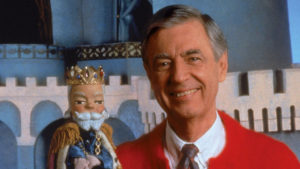 Mr. Rogers has a leaky wooden bucket. He takes us to the house of a neighbor who’s a woodworker. She repairs the bucket. I’m not sure, but I think she does it without glue or any kind of adhesive. Before Mr. Rogers leaves, he thanks his friend and says, “This is water-tight, right?” And the neighor says, “This should be water-tight.” Mr. Rogers takes the bucket back to his place and puts water in the bucket. It’s water-tight, and I’ve learned a new phrase at five years old.
Mr. Rogers has a leaky wooden bucket. He takes us to the house of a neighbor who’s a woodworker. She repairs the bucket. I’m not sure, but I think she does it without glue or any kind of adhesive. Before Mr. Rogers leaves, he thanks his friend and says, “This is water-tight, right?” And the neighor says, “This should be water-tight.” Mr. Rogers takes the bucket back to his place and puts water in the bucket. It’s water-tight, and I’ve learned a new phrase at five years old.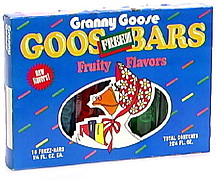 I have some kind of boo-boo, something bad enough to make me cry. My family is living on Treasure Island in San Francisco Bay. My dad is at work; I don’t know where my sister is. My mom puts a Band-Aid on it, or kisses it, or does some kind of mom magic that makes me feel better. Then she gives me a Granny Goose Goos-Bar (it was our family’s preferred brand; I don’t remember having Otter Pops until I was almost out of elementary school, at some kind of school function) and puts me in front of the TV to watch Mr. Rogers.
I have some kind of boo-boo, something bad enough to make me cry. My family is living on Treasure Island in San Francisco Bay. My dad is at work; I don’t know where my sister is. My mom puts a Band-Aid on it, or kisses it, or does some kind of mom magic that makes me feel better. Then she gives me a Granny Goose Goos-Bar (it was our family’s preferred brand; I don’t remember having Otter Pops until I was almost out of elementary school, at some kind of school function) and puts me in front of the TV to watch Mr. Rogers.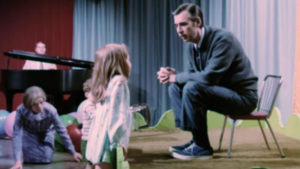 The kids in first and second grade liked Sesame Street. I liked Mr. Rogers. Still. None of the guys liked Mr. Rogers at all. Some of them said Mr. Rogers was gay. None of this was enough to make me change my mind. All of this is part of my first memory of being alienated from the other guys by liking something different, a state that never really went away.
The kids in first and second grade liked Sesame Street. I liked Mr. Rogers. Still. None of the guys liked Mr. Rogers at all. Some of them said Mr. Rogers was gay. None of this was enough to make me change my mind. All of this is part of my first memory of being alienated from the other guys by liking something different, a state that never really went away.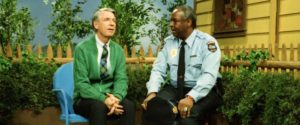 It’s a bit more trendy now to remember Mr. Rogers with fondness, and I want to feel good about it, but mostly I feel slightly resentful. I knew Mr. Rogers was awesome when I was three. Where were all these fans at seven and eight? I don’t need them now; I needed them then.
It’s a bit more trendy now to remember Mr. Rogers with fondness, and I want to feel good about it, but mostly I feel slightly resentful. I knew Mr. Rogers was awesome when I was three. Where were all these fans at seven and eight? I don’t need them now; I needed them then.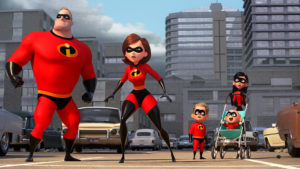 Although I am a deep admirer of Pixar Studios and its amazing work, I didn’t love The Incredibles in 2004, even acknowledging that the characters were well imagined and the story pretty creative. Breakneck action just doesn’t do much for me most of the time, and even at its most creative, my brain can only handle so much before it starts counting down the minutes until the end credits, which was my experience with the new sequel, Incredibles 2.
Although I am a deep admirer of Pixar Studios and its amazing work, I didn’t love The Incredibles in 2004, even acknowledging that the characters were well imagined and the story pretty creative. Breakneck action just doesn’t do much for me most of the time, and even at its most creative, my brain can only handle so much before it starts counting down the minutes until the end credits, which was my experience with the new sequel, Incredibles 2. I’m not complaining about too much action in an action movie any more than I’d complain about too much chocolate in a chocolate cake. I’m just noting that however good the action is, it turns me off after a point. Just like a too-chocolately chocolate cake.
I’m not complaining about too much action in an action movie any more than I’d complain about too much chocolate in a chocolate cake. I’m just noting that however good the action is, it turns me off after a point. Just like a too-chocolately chocolate cake.
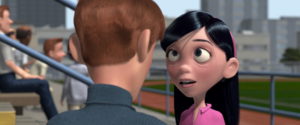
 It’s been thirty years since Christopher Robin last visited the Hundred Acre Wood, and he is sorely missed by its denizens. He’s a man now, with a career as an efficiency manager for a luggage company in post-WWII London. He has a wife and a daughter, and if he ever thinks of his friends Pooh and Piglet, you wouldn’t be able to tell.
It’s been thirty years since Christopher Robin last visited the Hundred Acre Wood, and he is sorely missed by its denizens. He’s a man now, with a career as an efficiency manager for a luggage company in post-WWII London. He has a wife and a daughter, and if he ever thinks of his friends Pooh and Piglet, you wouldn’t be able to tell. Since Christopher Robin will not visit the Hundred Acre Wood, which has always been there for him, Winnie-the-Pooh comes looking for Christopher Robin, stumbling into London through the door where they used to meet.
Since Christopher Robin will not visit the Hundred Acre Wood, which has always been there for him, Winnie-the-Pooh comes looking for Christopher Robin, stumbling into London through the door where they used to meet. Ewan McGregor is perfectly cast as middle-aged Christopher Robin, reminding me at times of his wonderful Alfred Jones character in Salmon Fishing in the Yemen, only not as funny. Brad Garrett seems like a no-brainer to voice Eeyore (my favorite), but he’s kind of distractingly recognizable as Brad Garrett most of the time. Young people will probably not have this issue, as Everybody Loves Raymond has been off the air for thirteen years.
Ewan McGregor is perfectly cast as middle-aged Christopher Robin, reminding me at times of his wonderful Alfred Jones character in Salmon Fishing in the Yemen, only not as funny. Brad Garrett seems like a no-brainer to voice Eeyore (my favorite), but he’s kind of distractingly recognizable as Brad Garrett most of the time. Young people will probably not have this issue, as Everybody Loves Raymond has been off the air for thirteen years. Another excellent decision was to represent the animal characters based on the original drawings by E. H. Shepard in the books, rather than on the Disney cartoons that have replaced them in many of our minds. However the animators managed to put these characters on the screen, the animals seem pretty real to me throughout the film, in both their and Christopher Robin’s realities. Which is rather perfect.
Another excellent decision was to represent the animal characters based on the original drawings by E. H. Shepard in the books, rather than on the Disney cartoons that have replaced them in many of our minds. However the animators managed to put these characters on the screen, the animals seem pretty real to me throughout the film, in both their and Christopher Robin’s realities. Which is rather perfect. Although I admit I found most of the third act disappointing, I cannot deny the emotional effect the very existence of this film had on me, an enormous fan of the books by A. A. Milne. I did not have these books read to me as a child, and I came to them rather late, beginning in sixth grade and finishing in seventh. I don’t know what drew me to them then, but I hold tightly to them today for their utter lack of cynicism, for their pureness of spirit, and for their steadfast belief in the virtues of kindness, curiosity, imagination, and the specialness of certain relationships.
Although I admit I found most of the third act disappointing, I cannot deny the emotional effect the very existence of this film had on me, an enormous fan of the books by A. A. Milne. I did not have these books read to me as a child, and I came to them rather late, beginning in sixth grade and finishing in seventh. I don’t know what drew me to them then, but I hold tightly to them today for their utter lack of cynicism, for their pureness of spirit, and for their steadfast belief in the virtues of kindness, curiosity, imagination, and the specialness of certain relationships.